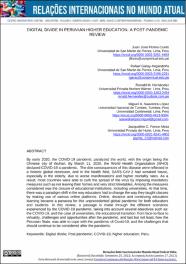“DIGITAL DIVIDE IN PERUVIAN HIGHER EDUCATION: A POST-PANDEMIC REVIEW“

Ver/
Descargar
(application/pdf: 323.8Kb)
(application/pdf: 323.8Kb)
Fecha
2023Autor(es)
Flores-Cueto, Juan José
Garay-Argandoña, Rafael
Hernández, Ronald M.
Saavedra-López, Miguel A.
Ponce-Meza, Jacqueline C.
Metadatos
Mostrar el registro completo del ítemResumen
By early 2020, the COVID-19 pandemic paralyzed the world, with the origin being the Chinese city of Wuhan. By March 11, 2020, the World Health Organization (WHO) declared COVID-19 a pandemic. The dire consequences of this disease were reflected in a historic global recession, and in the health field, SARS-CoV-2 had wreaked havoc, especially in the elderly, due to worse manifestations and higher mortality rates. As a result, most countries were able to curb the spread of the virus by imposing mandatory measures such as not leaving their homes and very strict timetables. Among the measures considered was the closure of educational institutions, including universities. At that time, there was a paradigm shift in the way educators had to change the way they taught classes by making use of various online platforms. Online, distance and continuing education learning became a panacea for this unprecedented global pandemic for both educators and students. In this review, a passage is made through the different scenarios experienced by the COVID-19 pandemic, taking into account several objectives such as: the COVID-19, and the case of universities, the educational transition: from face-to-face to virtuality, challenges and opportunities after the pandemic, and last but not least, how the Peruvian State, was able to cope with the pandemic of Covid-19, and the challenges that should continue to be considered after the pandemic.
Colecciones
- SCOPUS [380]

